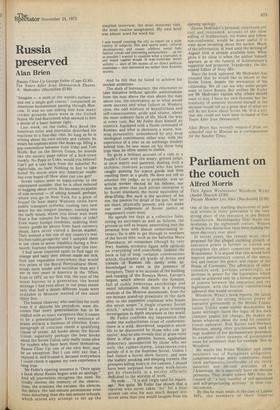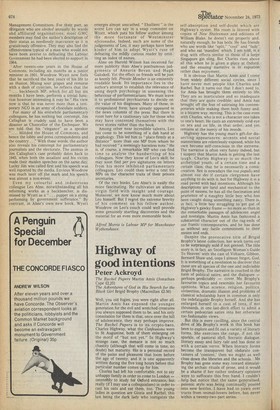Parliament on the couch
Alfred Morris
Turn Again Westminster Woodrow Wyatt (Andre Deutsch E2.95) Private Member Leo Abse (Macdonald 0.50) One of the more startling discoveries of political writers in every generation is the very strong place of the executive in the British Constitution. Montesquieu first made the revelation in the eighteenth century. Writers of much less distinction have been making the same discovery ever since.
In recent years, the remedy most often proposed for the alleged alarming growth of executive power is further to extend and strengthen the select committee system at Westminster. It is argued that this would both improve parliamentary control of the executive and restore the power and repute of the House of Commons. The advocates of other remedies seek, perhaps unwittingly. an increase, in power for the legislature which could be achieved only by a formal separation of powers between the executive and the legislature, with the historic constitutiona/ upheaval this would occasion.
Woodrow Wyatt's book reports the latest discovery of the strong relative power of executive government in the British Constitution. Unlike some earlier discoverers, he quite wittingly ,faces the logic of his own clamant appeal for change. He makes no bones whatever about the need for constitutional upheaval. Rab Butler and Herbert Morrison, among other practitioners, used to urge students of our parliamentary procedure to examine other systems of government more for avoidance than for example. Not so Woodrow.
He wants the Prime Minister and other ministers out of Parliament alt6gether. congressional-type select committees, fixedterm parliaments (preferably of six years' duration) and election primaries, all a l'Americain. He is especially keen on election primaries. They would relieve MPs from the control of " a tiny handful of self-appointed and self-perpetuating activists " in their constituencies.
By this he must mean, in the case of Labour MPs, the members of their General
Management Committees. For their part, as delegates who are elected annually by wards abd affiliated organisations, most GMC members may find the author's description of their status as needlessly inaccurate as it is gratuitously offensive. They may also find the offensiveness typical of a man who would not have been averse to defeating the Labour Government he had been elected to support in 1964.
' After twenty-one years in the House of Commons, including six months as a junior minister in 1951, Woodrow Wyatt now feels that he sacrificed the best years of his life to an illusion. Mixing sour grapes and remorse with a dash of cynicism, he reflects that the " ... backbench MP, which for all but six months I have been, performs a trivial function however interesting it may be." His view now is that he was never more than a temporary NCO in an army of chocolate soldiers. For many of his erstwhile parliamentary colleagues, he has nothing but contempt. Jim Callaghan is crudely said to have been a disaster as Chancellor of the Exchequer. We are told that his "elegance" as a speaker blinded the House of Commons, and hence the lobby and press correspondents and the country ..." With these words, the author also reveals his contempt for parliamentary journalists and the electorate. The animus in Jim Callaghan's case probably dates back to 1945, when both the assailant and his victim made their maiden speeches on the same day. Lucky Jim was called first and his speech was well reported by the media. Envious Woodrow was much later off the mark and his speech was almost a non-event.
Even my colourful and industrious colleague Leo Abse, notwithstanding all his reforming works as a backbencher, is dis missed by Wyatt as a " puppet on a string performing by government sufferance." By contrast, in Abse's own new book, Wyatt
emerges almost unscathed. " Ebullient" is the worst Leo can say in a snap comment on Wyatt, which puts his fellow author among the more fortunate of Westminster aficionado's. Indeed, such are some of the judgements of Leo, it may perhaps have been kinder of him to adopt Wyatt's ruse of defeating the mildly curious reader by omitting an index of names.
Abse on Harold Wilson has received far more publicity than Abse's posthumous judgements of Aneurin Bevan and Hugh Gaitskell. Yet the effect on friends will be just as keenly felt. Private Member is an eminently readable book. Its importance lies in the author's attempt to establish the relevance of using depth psychology in assessing the behaviour of parliamentarians. We must leave it to professional psychiatrists to decide on the value of his diagnoses. Many of these, in encapsulated form, have already appeared in the news columns of the press. But there is room here for a cautionary tale for those who may have contented themselves with the news stories rather than the book.
Among other near incredible talents, Leo has come to be something of a dab hand at graphology. This led him to "place firmly at a distance" more than one MP from whom he had received "a seemingly harmless note." He is, of course, a remarkable MP who can find time to analyse the handwriting of his colleagues. Now they know of Leo's skill, he may soon find per pro signatures on letters from his more inhibited parliamentary colleagues. Leo could then write a text for MPs on the character traits of their private secretaries.
Of the two books, Leo Abse's is easily the more fascinating. He cultivates an almost virgin field with insight and courage. Moreover, we now know much more about Leo himself. But I regret the extreme brevity of his comment on his fellow author. Woodrow on Leo's couch could well provide some genuinely startling discoveries and the material for an even more memorable book.
Alfred Morris is Labour MP for Manchester Wythenshawe.



































 Previous page
Previous page